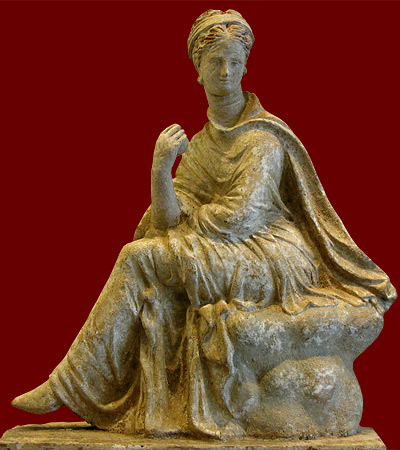
Terracotta mold figurine, Tanagra, 4th century BCE

Pyrrha is represented in this poem not as a fully realized woman but through the eyes of her former lover as passion personified, a force of nature, the stereotypical deceptive seductress. It is unclear whether she received her name (a feminine derivative of the Greek word for fire) for the color of her hair or for her violent temperament (like Pyrrhus, son of Achilles, and the Greek king and general Pyrrhus who threatened Roman expansion in South Italy in 280 BCE). Her non-Roman name and her intimacies with men suggest that she was neither ingenua nor exactly libera, but rather some form of hetaira, an elegant meretrix who was free to choose where and on what basis to bestow her favors. Pyrrha is the addressee of the poem, knowingly spoken to, while her current hopeful lover and his adulation is indulgently described. Unlike the typically jealous lover of elegiac love poetry, the poet seems to view his replacement in Pyrrha's affections indulgently (puer), perhaps as a young and inexperienced version of himself in former times. This arrangement allows him to explore the duality of the male experience of the female — like the rose her beauty captivates while covering the thorns, like the sea she glistens while turbulence awaits below. In the spirit of ironic playfulness for which the love poetry of Horace and Ovid are famous, the poet closes his poem with the humorous representation of himself as the sailor who has survived the "storm" of Pyrrha and joyfully dedicates his sodden clothes to the gods in thanksgiving. Horace employs a light meter for his subject (listen), the 4th Asclepiadean: in each of the four four-line stanzas the first two lines are in 1st Asclepiadean meter, the third line is Pherecratean, the final line is Glyconic (for the meters of Horace see Hendry; for the interplay of word and meter in I.5 see Harris).
Quis
multa
gracilis te puer in
rosa,![]()
perfusus liquidis urget odoribus
5 simplex munditiis? Heu quotiens fidem
mutatosque deos flebit et aspera
qui
nunc te
fruitur
credulus
aurea,![]()
10qui semper vacuam, semper amabilem
intemptata
nites. Me
tabula
sacer![]()
vestimenta maris deo.
Click on the underlined words for translation aids and
commentary, which will appear in a small window. Click on the icon link
![]() to the right of the
poem for related images and information.
to the right of the
poem for related images and information.